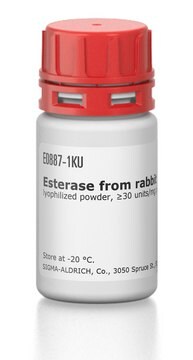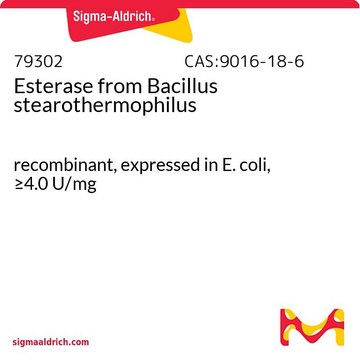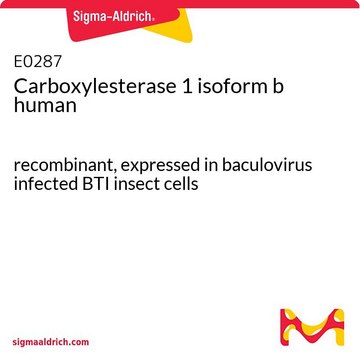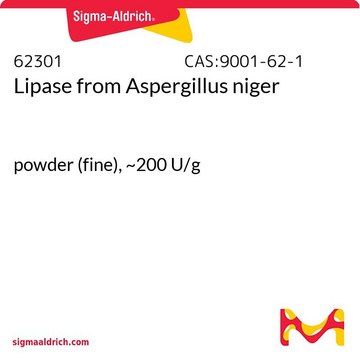E3019
Esterase from porcine liver
lyophilized powder, ≥15 units/mg solid
Sinónimos:
Carboxyl esterase, Carboxylic-ester hydrolase, PLE
Iniciar sesiónpara Ver la Fijación de precios por contrato y de la organización
About This Item
Productos recomendados
form
lyophilized powder
specific activity
≥15 units/mg solid
mol wt
168 kDa
application(s)
diagnostic assay manufacturing
storage temp.
−20°C
¿Está buscando productos similares? Visita Guía de comparación de productos
Application
Esterase from porcine liver has been used in a study to assess the effect of 5-aminolaevulinic acid peptide prodrugs on photosensitization for photodynamic therapy. Esterase from porcine liver has also been used in a study to investigate how site-specific atherogenic gene expression correlates with subsequent variable lesion development in coronary and peripheral vasculature.
Porcine liver esterase is used to catalyze the hydrolysis of pentaacetyl catechin and epicatechin for use in pharmaceutical and industrial applications.
Pig liver esterase is commonly used for kinetic resolutions and assymetric synthesis in organic chemistry.
Pig liver esterase is commonly used for kinetic resolutions and assymetric synthesis in organic chemistry.
The enzyme from Sigma has been immobilised in hollow fibre ultrafiltration membrane and used for the asymmetric hydrolysis of a meso-diester. Esterase from Sigma has been used to investigate its effect on the release of methacrylic acid (MAA) and 2-hydroxyethyl methacrylate (HEMA) from adhesives formulated under conditions simulating wet bonding. It has been used to examine the ability of carboxylesterase activity to remove permethrin- and bifenthrin-associated toxicity to Ceriodaphnia dubia and Hyalella azteca in a variety of matrices.
Biochem/physiol Actions
Esterase acts on water-soluble carboxyl esters containing short chain fatty acids. Its functionality is attributed to the catalytic triad of Ser, His and Asp/Glu.
Pig liver esterase catalyzes enantioselective conversion of an ester to a carboxylic acid. The molecular weight is found to be 168 kDa. It is a serine enzyme with two active sites on each molecule, which dissociates into active half-molecules in the presence of dilute acid or concentrated salts.
Unit Definition
One unit will hydrolyze 1.0 μmole of ethyl butyrate to butyric acid and ethanol per min at pH 8.0 at 25 °C.
signalword
Danger
hcodes
pcodes
Hazard Classifications
Resp. Sens. 1
Storage Class
11 - Combustible Solids
wgk_germany
WGK 1
flash_point_f
Not applicable
flash_point_c
Not applicable
ppe
Eyeshields, Gloves, type N95 (US)
Elija entre una de las versiones más recientes:
¿Ya tiene este producto?
Encuentre la documentación para los productos que ha comprado recientemente en la Biblioteca de documentos.
Asymmetric hydrolysis of a meso-diester using pig liver esterase immobilised in hollow fibre ultrafiltration membrane.
Sousa HA, et al.
Tetrahedron Asymmetry, 11(4), 929-934 (2000)
Craig E Wheelock et al.
Environmental toxicology and chemistry, 25(4), 973-984 (2006-04-25)
Increases in the use and application of pyrethroid insecticides have resulted in concern regarding potential effects on aquatic ecosystems. Methods for the detection of pyrethroids in receiving waters are required to monitor environmental levels of these insecticides. One method employed
Kazuhito Watanabe et al.
Biological & pharmaceutical bulletin, 28(9), 1743-1747 (2005-09-06)
The properties of ES46.5K, an esterase from mouse hepatic microsomes, were compared with those of carboxylesterases from rabbit and porcine liver. The inhibitory profile with a serine hydrolase inhibitor (bis-p-nitrophenylphosphate) and detergents (sodium dodecylsulfate, Emulgen 911) was different between ES46.5K
Elisabet L Kostoryz et al.
Journal of biomedical materials research. Part B, Applied biomaterials, 88(2), 394-401 (2008-04-09)
Dentin adhesives may undergo phase separation when bonding to wet demineralized dentin. We hypothesized that adhesives exhibiting phase separation will experience enhanced biodegradation of methacrylate ester groups. The objective of this project was to study the effect of enzyme-exposure on
Enzyme-responsive snap-top covered silica nanocontainers.
Kaushik Patel et al.
Journal of the American Chemical Society, 130(8), 2382-2383 (2008-02-01)
Nuestro equipo de científicos tiene experiencia en todas las áreas de investigación: Ciencias de la vida, Ciencia de los materiales, Síntesis química, Cromatografía, Analítica y muchas otras.
Póngase en contacto con el Servicio técnico









